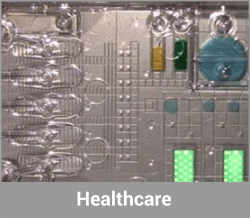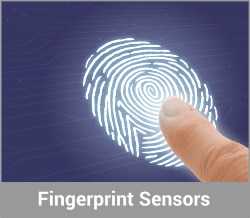Sensors & Switches
For smart products
with rich user interface

THE RAPID DEVELOPMENT OF KEYBOARD TECHNOLOGIES
In the Human-Machine Interface (HMI) mechanical buttons and knobs have long been replaced by microprocessor-based Membrane Keyboards (MKB) that require less space and wiring and are more elegant and affordable. Using a thin polymer film panel on which the electrical wiring is printed with polymer thick-film (PTF) silver inks, MKBs are additionally water- and dustproof.
More recently, capacitive touch (or cap-touch) technology started to displace MKB technology. Polymer films and printed silver circuitry have remained, but, in order to create transparent backlit conductive touch areas, keyboard makers used Indium Tin Oxide (ITO) films for screen printing of the electronic circuits. Because ITO printing includes a cumbersome and expensive subtractive process to remove ITO where it is not needed, Agfa soon offered PEDOT-PSS inks. PEDOT:PSS inks have now become the industry standard solution for making transparent cap-touch sensor film, in markets as diverse as automotive, white goods and kitchen appliances, and medical instruments.
While the early conductive inks containing metal silver flakes reached a conductivity efficiency of only 15%, Agfa’s latest series reach silver efficiency up to more than 40% and higher) and the use of nano-sized silver particles allows for thinner deposits. The associated finer lines allow for further miniaturization and more than compensate for the higher cost of the nanosilver ink, when looking at the cost per printed part.
Next to keyboard applications, Agfa’s PEDOT:PSS-based pastes and inks for screen and inkjet printing are appreciated in a variety of industry segments.
APPLICATIONS



